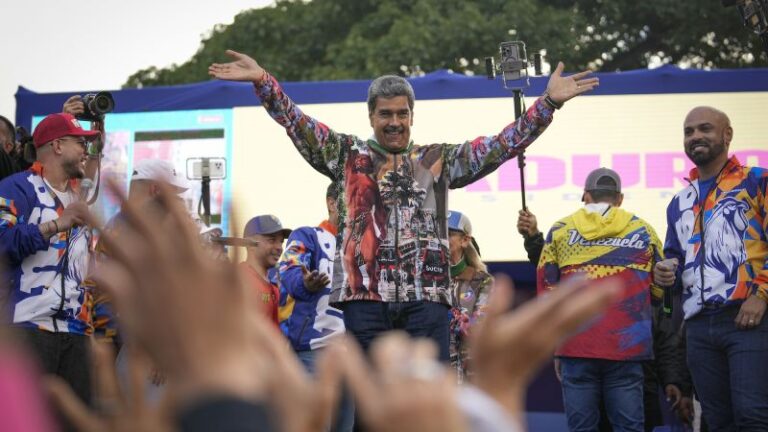Caracas
CNN
—
It would be easy to dismiss this Sunday’s presidential election in Venezuela as a fait accompli. The country’s opposition is challenging strongman Nicolas Maduro, who has ruled the country since 2013 and has made clear his intention to continue. Maduro said last week that Venezuela could face “bloodshed” if he is not re-elected.
The Maduro regime controls all of Venezuela’s public institutions and has been accused of voter fraud in the past, most notably in 2017 when electoral officials briefly announced that the opposition had won a gubernatorial election, then reversed the decision in favor of a government candidate, a case widely seen as a clear-cut example of electoral fraud. Ahead of the elections, a new report by local NGO Laboratorio de Paz said there have been more than 70 cases of arbitrary detention since the election campaign officially began on July 4.
But uncertainty has become the mantra in Caracas of late: The opposition movement has reinvigorated its base, Edmundo González’s candidacy has garnered broad support inside and outside Venezuela, and there is widespread agreement that Maduro’s government faces its toughest elections in 25 years.
The stakes are high, both at home and abroad.
“What the vote is asking is how long it will take to rebuild Venezuela’s economy,” Asdrubal Oliveros, founder of the Caracas firm Ecoanalytica, said on our weekly podcast on July 8.
Under Maduro, oil-rich Venezuela has suffered the worst peacetime economic collapse of any country in recent memory. Once Latin America’s fifth-largest economy, it is now the size of a mid-sized city smaller than Milwaukee, according to IMF data.
After years of chronic shortages, most basic goods are widely available in Venezuela, but too expensive for most to afford. Today, with a minimum wage of around $3 a month, plus the equivalent of $40 in government benefits like food stamps and gas subsidies, more than eight in 10 Venezuelans live below the poverty line, according to an independent study by the Andrés Bello Catholic University in Caracas.
The opposition blames Maduro’s policies and chronic corruption for the collapse, but Maduro says Venezuela is the victim of an “economic war,” including widespread U.S. sanctions imposed on Venezuela’s key export, oil, in 2019 when the economy was already in ruins.
Gabriela Oraa/AFP/Getty Images
Venezuelan presidential candidate Edmundo Gonzalez and opposition leader Maria Corina Machado address students during a campaign rally at the Central University of Venezuela in Caracas, July 14, 2024.
But a win for Gonzalez could change all that, especially if the U.S. lifts sanctions and welcomes a democratic government. Venezuela has the world’s largest oil reserves. If elected, Gonzalez aims to make Venezuela the “energy hub of the Americas.”
Internationally, the outcome of the vote is expected to have migration effects across the Americas, including the United States. Around eight million Venezuelans have already fled the country since its economy collapsed, many of them scattered across South America.
A recent survey by Venezuelan pollster ORC Consultors said more than 18% of respondents plan to leave the country by the end of the year if Maduro wins.
Meanwhile, a victory for Gonzalez and the Democratic Opposition would be a historic event that would swing the geopolitical pendulum in Latin America and beyond.
The Maduro regime is a staunch ally of China, Iran and Russia. Caracas, less than 1,400 miles from Miami, is often touted as a bridgehead for Russian President Vladimir Putin and Chinese President Xi Jinping in Washington’s backyard. Another regional ally, Cuba, currently receives free shipments of Venezuelan oil to support its industry.
Under Maduro’s rule, Venezuela has become increasingly isolated, withdrawing from regional forums such as the Organization of American States and having its membership of Mercosur, Latin America’s largest economic union, suspended.
Gonzalez, a 20th century diplomat who has lived in Algiers, Brussels and Buenos Aires and speaks English and French in addition to his native Spanish, is expected to look to democratic governments in the region, including Washington, to work on rebuilding international relations. He also plans to strengthen ties with multilateral organizations such as the IMF, World Bank and Inter-American Development Bank to raise much-needed funds to subsidize the economy, at least in the short term, according to the opposition’s economic policy.
Currently, most state institutions, such as the Supreme Court and the attorney general’s office, are in the hands of regime supporters, but Gonzalez says he will depoliticize those positions and free political prisoners. In an interview with CNN earlier this year, the candidate said he wanted to “reinstitutionalize” the Venezuelan state after two decades of economic and social collapse.
And that’s perhaps the biggest concern in Sunday’s election.
In recent years, there has been talk of a crisis in democracy, with the UK’s withdrawal from the EU, the rise of neo-fascism in Europe, the collapse of democracy in India, Turkey, the Philippines and countries in the global south, and Donald Trump’s inauguration as US president and his run for reelection.
But the new dawn in Caracas will prove that representative democracy still has plenty of appeal to those who don’t like it.


